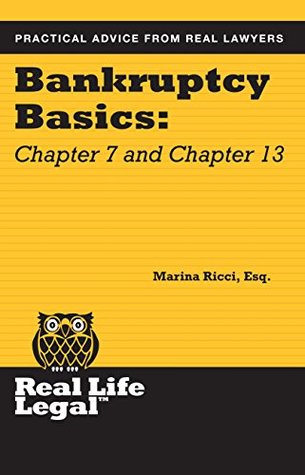Download Bankruptcy Basics: Chapter 7 and Chapter 13 (A Real Life Legal Guide) - Marina Ricci Esq. file in ePub
Related searches:
BANKRUPTCY AND CHILD SUPPORT COLLECTION Section I
Bankruptcy Basics: Chapter 7 and Chapter 13 (A Real Life Legal Guide)
Bankruptcy Basics to Understand in Chapter 7 and Chapter 13
Chapter 7 Bankruptcy Basics and Eligibility Cisowski Law
92 4684 3513 1183 1644 2340 2241 1652 4175 736 860 2194 2537 3016 2192 2232 3832 4599 3863 633 2665 1829 1783 2393 3044 2703 4357
A successfully completed chapter 7 bankruptcy can wipe out most debts.
Bankruptcy case, usually chapter 7, 11, or 13, the bankruptcy court can assist the debtor in restructuring his debts bankruptcy basics.
Chapter 7 debtors must turn over their non-exempt assets to a bankruptcy trustee, who then sells them and pays the creditors.
Here you'll find overview articles explaining what bankruptcy is, the difference between chapter 7 and chapter 13 bankruptcy, how each type of bankruptcy.
Chapter 7 is referred to as “liquidation”, where the debtor's nonexempt assets are liquidated and distributed to creditors.
Learn more about the differences between chapter 7 and chapter 13 bankruptcy. Find out which may be most appropriate to file in your own personal situation. Advertiser disclosure: the credit card and banking offers that appear on this site.
If you are thinking about declaring bankruptcy, there is lot you need to know. Start your journey to financial freedom here by eliminating debt. Image by adrian mangel © the balance 2019 making ends meet can be difficult, and people sometim.
Debt relief throughchapter 7 bankruptcy a chapter 7 bankruptcy allows you to discharge most or all your debts while retaining most or all your property.
If you’re behind and want to keep your home, the better option is to file a chapter 13 case. Unlike a chapter 7 bankruptcy, it has a provision that allows you to catch up on mortgage arrearages over the course of a three- to five-year repayment plan.
Both the chapter 7 and chapter 13 versions of local form 2 have been updated to correct an issue more fri, 01/29/2021 new administrative order on highly sensitive documents.
Going into debt for one thing or another has become a fact of life for many americans. We live in a society that promotes buying things, even if it means overextending ourselves. Credit card debt continues to flirt with all-time record-high.
Budget and credit counseling – before you file bankruptcy you must complete a credit counseling class.
Bankruptcy court, district of nevada website for cm/ecf filing, training and bankruptcy and filing information.
Vous trouverez dans ici le détail sur les médicaments remboursés en france entre 2012 et 2019 (quand des données plus récentes seront publiées, elles seront mises à jour).
The other type of bankruptcy - chapter 13 bankruptcy, stays on your credit report for only 7 years after filing bankruptcy. You should get in the practice of monitoring your credit report to make sure all the information is correct and be able to address any inaccuracies as quickly as possible.
The most common debts discharged in a chapter 13 proceeding are medical bills, credit card debt and personal loans.
Chapter 13 provides some advantages over chapter 7, including a broader discharge and the ability to pay mortgage arrearages, preventing foreclosure, through.
However, refunds may be subject to delay, to turnover requests by the chapter 7 trustee, or used to pay down your tax debts.
Chapter 7 bankruptcy is the simplest and most common form of bankruptcy. In chapter 7, if the debtor has assets not protected by an exemption, a court appointed trustee may sell the assets and distribute the net proceeds to creditors according to the priorities established in the code.
In certain situations, filing a chapter 13 bankruptcy immediately after completing a chapter 7 bankruptcy, informally referred to as by patricia dzikowski, attorney some debtors have financial problems that are not completely solved by eith.
Debtors who file for chapter 7 bankruptcy can eliminate almost all of their debts once a discharge is entered at the end of the case.
Chapter 7 - bankruptcy basics this chapter of the bankruptcy code provides for liquidation - the sale of a debtor's nonexempt property and the distribution of the proceeds to creditors. Debtors should be aware that there are several alternatives to chapter 7 relief.
Should i file for chapter 7 bankruptcy? last review and update: jan 27, 2020.
Chapter 7 bankruptcy is the most forgiving for an individual or couple.
When an individual claims they're bankrupt, it's typically a chapter 13 bankruptcy, according to the united states courts website.
Chapter 13 bankruptcy allows a individuals and sole proprietors to seek protection from creditors and reorganize debts without liquidating assets. Ariel skelley / getty images chapter 13 bankruptcy allows a debtor to seek shelter from credi.
Mar 12, 2021 in addition to filing their schedules and statements, chapter 11 debtors also file a plan that proposes to repay creditors, as well as restructure.
Chapter 7 of title 11 of the united states code (bankruptcy code) governs the process of liquidation under the bankruptcy laws of the united states, in contrast.

Post Your Comments: